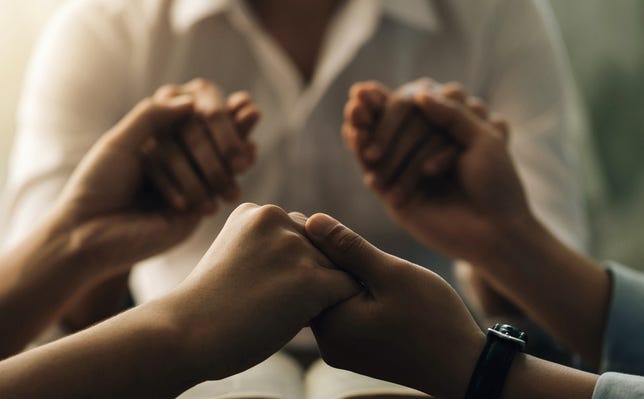Something important happened last week, and it was before the tragedy in Utah. In the wake of a shocking murder on her city’s light rail system, Charlotte mayor Vi Lyles announced she was praying for the victim’s family, and it did not earn her condemnation from the political left. Her statement said:
“This was a senseless and tragic loss. My prayers remain with her loved ones as they continue to grieve through an unimaginable time.”
Normally, offering “thoughts and prayers” after a tragedy is derided by the left as a meaningless and insufficient gesture. But when the offer came from a liberal, it was tolerated, or at least ignored by fellow lefties. I know nothing about Lyles’ own faith, though I read that she’s buried two husbands, one of whom took his own life, and she’s been diagnosed with breast cancer. That is enough for me to accept she sincerely values prayer. Me too.
On this date, September 16th, five years ago, I found out I had an aggressive form of cancer, a rare malignant tumor in my left sinus, a millimeter or so from my brain. Lots of people prayed for me, and some even told me about it. Rest assured: I could tell.
Political partisans diminish the offering of prayers because they are not the ones in need of the prayer, as far as they know. The raft of intercession, inflated by others breathing it into reality, looks different when one is drowning in sorrow or dread.
When my mother was in her last days, battling pulmonary fibrosis and breast cancer, she would smile and say she was confident God would soon call her by name. So many people were praying, she said, that her name had to be fresh on God’s mind. For her, the prayers of others were not a blanket, but an escalator.
It is not lost on me that some who belittle the offering of thoughts and prayers by public figures are non-believers. The Gallup Poll says that 81 percent of Americans believe in God, but Pew reports only 44 percent pray daily in our secular age. All these numbers are declining most precipitously among Democrats according to researcher
which accounts for the confidence liberal politicians have in renouncing those sending “thoughts and prayers” to those in distress. They know there is scant political price to be paid.I should note that Mayor Lyles’ statement on the murder of Iryna Zarutska, a 23-year old Ukrainian refugee, did earn rebuke, but for what it did not say instead of what it did. The New York Post said she was “ripped over woke response demanding ‘compassion’ for madman.” CNN said it “highlights Democrats’ problems talking about crime.” White House spokesperson Karoline Leavitt criticized Lyles, but only after agreeing with the Mayor on the prayer part.
Growing up Southern Baptist, intercessory prayer was a practice I learned early. We even had a mid-week church service called “prayer meeting.” Putting someone on the prayer list was a discipline formed in childhood Sunday School, with patient teachers dutifully writing down plaintive requests for “granny’s bad back” or “my cousin’s sick dog.” As steeped as I am in the practice, you would not be able to talk me out of it today, even if I did not have first-hand experience on the beneficiary end.
There is an innate human desire to connect with the distressed and downtrodden, even by people who do not grow up Baptist, or saying the Catholic rosary, or having a grandmother in a Methodist prayer circle. The impulse is so strong, secular people – or those who are religious themselves but careful about sensibilities - will go on Facebook and earnestly say they are “sending good vibes,” whatever that means. My advice is that if you have an urge to send vibes, but not prayers, send a note or a casserole instead. Lord knows casseroles and cooking matter too - when I was dealing with my tumor an angel who had attended college in Tuscaloosa sent me Dreamland Bar-b-que, and that was just about all the help I needed that day. Jesus and Johns Hopkins were in charge, but smoked pork and sliced bread hit the spot.
Intercessory prayer was a duty of the earliest Christian community, as evidenced by its prominence in the Pauline epistles of the New Testament. It has deep roots in Judaism, from Moses to Daniel to the beautiful practice of Shiva, in which mourners take on not only supplication for, but physical presence with, the aggrieved.
The derision by politicians or anonymous internet posters of offered prayers is usually a platform for political combat on a policy measure like gun control, as uncouth as that may be. This springboard off sacrilege offends few of those whose own faith is not discounted by extension.
Sadly, the social media era has added endless opportunities for potshots at verbalized expressions of intercession. If that possibility makes you reticent, and you are not a hands-emoji-announce-your-prayers kind of person, keep them to yourself; their efficacy will be unaffected by Meta’s inability to monetize them. But if that private prayer leaves you feeling a need to do more, toss a few bucks to Dreamland.
In Case You Missed It: I get the feeling a lot of you were digging out from the post-Labor Day work pile and overlooked my column on the Supreme Court. Maybe I mis-named it. Check out LET YOUR EARS OPEN YOUR EYES.
A Hat Tip: The great Peggy Noonan wrote a column on “thoughts and prayers” this week for the Wall Street Journal. I had not read her piece when I wrote mine, which is a good thing as it would have intimidated me out of it.
The Archives: Every column from The What For, dating back to April, is available here on the website, and you can see if your favorites match the ones that got the most traction.



